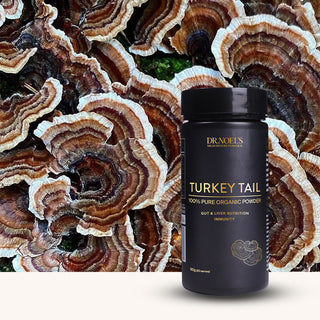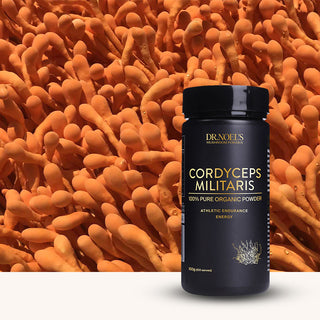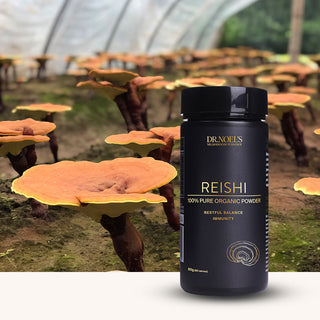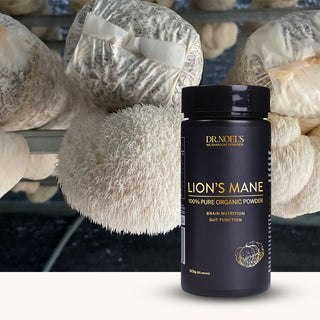Scientists and health professionals are exploring the use of Lion’s mane mushrooms and its potential to help with nerve damage. Lion’s mane is a type of medicinal mushroom that has been used in traditional Chinese medicine and Japanese medicine for centuries, and more recently, incorporated into Western society. There is some science to back up its use for nerve support, which we will outline in this article.
Neuropathy is a general term for a range of conditions that affect the nervous system. Neuropathy can be caused by diabetes, injury, infection, or other factors. Symptoms of neuropathy include pain, numbness, and tingling in the hands and feet. Neuropathy can also cause problems with balance and coordination.
There are several types of neuropathy.
- Peripheral neuropathy affects the nerves outside of the brain and spinal cord.
- Autonomic neuropathy affects the nerves that control automatic body functions such as blood pressure and heart rate.
- Proximal neuropathy affects the muscles closest to the body’s trunk. Focal neuropathy affects a single nerve or group of nerves.

According to a 2019 study, it is estimated that 6 to 51% of adults with diabetes suffer from peripheral neuropathy.
In those with prediabetes, it is estimated that 9-38% of people suffer from autonomic neuropathy.
What Is Nerve Damage?
Nerve damage is a common symptom of neuropathy. Nerve damage can cause pain, numbness, tingling, and muscle weakness. Nerve damage can also make it difficult to control automatic body functions such as blood pressure and heart rate.
Treatments for nerve damage
Treatment for neuropathy focuses on relieving the symptoms. Neuropathy can be a difficult condition to live with, but there are treatments available that can help relieve the symptoms. With proper treatment, many people with neuropathy are able to lead full and active lives.
There are several treatments for neuropathy and nerve damage, including:
- Over-the-counter pain relievers: These can help relieve mild pain.
- Prescription medications: These can be used to treat more severe pain.
- Surgery: This may be an option for people with severe nerve damage.
- Physical therapy: This can help improve muscle strength and function.
- Massage: This can help relieve muscle tension and pain.
- Acupuncture: This is a traditional Chinese medicine treatment that involves inserting needles into the skin at specific points.
Is Lion’s Mane Mushrooms Beneficial For Nerve Support?
Lion’s Mane mushrooms may be able to assist with nerve support. Nerve support is an important part of neuropathy treatment. Nerve support helps to protect the nerves and prevent further damage.
There are several types of nerve support:
- Nutritional supplements: These can help to improve nerve function and reduce inflammation.
- Exercise: This can help to improve blood circulation and reduce nerve damage.
- Physical therapy: This can help to strengthen muscles and improve range of motion.
- Occupational therapy: This can help you learn new ways to perform everyday tasks.
There are two main active compounds in lion’s mane that are thought to be responsible for its nerve-supporting effects. These compounds are hericenones and erinacines. Both of these compounds have been shown to help promote nerve growth factor (NGF), which is a protein that helps support the growth and maintenance of nerve cells.

A study in rats found that hericenones was able to promote the production of NGF, which led to the regeneration of damaged nerve cells. Another study found that erinacines were able to cross the blood-brain barrier and increase NGF levels in the brain. This suggests that lion’s mane may be able to help repair damage to the nervous system.
The NGF-inducing activity of Hericium erinaceus was explored in a 2008 Japanese study performed on human brain cells. In this, the alcoholic extracts of four medicinal mushrooms, including Lion’s mane, were used for examination. Of the four mushrooms examined, only Hericium erinaceus promoted the expression of NGF. Researchers concluded that Lion’s mane mushroom contains active compounds that stimulate NGF synthesis via activation of specific pathways.
Likewise, the neurotrophic properties of Lion’s mane mushrooms were evaluated in another 2013 study from Malaysia. Hericenones and erinacines isolated from the medicinal mushroom increased the neurite outgrowth, a process where developing nerve cells produce new projections, by a staggering 60.6%. Researchers concluded that extracts of Hericium erinaceus mushrooms contained neuroactive compounds which induced NGF-synthesis and promoted neurite outgrowth.
What Is Nerve Regeneration?
Nerve regeneration, also known as nerve growth is the process by which nerves regrow and heal after they have been damaged. Nerve regeneration can take place after an injury or due to neuropathy. The nervous system is made up of cells called neurons. When neurons are damaged, they die. This damage can be caused by injury, disease, or toxins.
After a neuron dies, the body starts the process of nerve regeneration. This process involves the growth of new nerve cells, also called neurons. The new neurons grow from existing nerve cells that are still alive. They first extend their cell bodies towards the area of damage. Then, they send out long fibers called axons to connect with other nerve cells. Finally, they send out short fibers called dendrites to connect with muscle cells.
Nerve regeneration is a slow process. It can take weeks or even months for new nerve cells to grow and connect with other cells. However, with time and proper treatment, most people with neuropathy are able to regain some or all of the function that was lost due to nerve damage.
How Can Lion’s Mane Mushrooms assist with Nerve regeneration?
Lion’s Mane mushrooms may be able to assist with nerve regeneration. In a 2016 study, the ability of Hericium erinaceus to activate the regeneration of peripheral nerves was evaluated. The aqueous extract of the medicinal mushroom was given orally to rats with peroneal nerve injury. Results of the study showed that the treated groups expressed higher markers of regeneration as opposed to those animals who were not administered the mushroom. Researchers concluded that Lion’s mane mushroom is capable of promoting peripheral nerve regeneration after injury which could be attributed to increased protein synthesis.
In another experimental study, the neurodegenerative potential of Lion’s mane mushroom in the treatment of peripheral nerve injury was reviewed. The nerve repairing possibility of the mushroom was compared to vitamin B12 or mecobalamin which is widely used in the treatment of nerve disorders.
There was an earlier return of hind limb function and normal toe spreading in rats who were given the aqueous extract of Hericium erinaceus than those who did not. Based on the results of this 2012 study, daily oral administration of Lion’s mane mushrooms could promote the regeneration of nerves in the early stage of recovery.
How to take Lion’s Mane mushrooms for nerve support and growth?
Many people are using lion’s mane to help ease the symptoms of nerve damage. Lion’s mane can be consumed in various ways, such as boiling fresh mushrooms into a tea or a broth, or taking it as a supplement in powder, capsule, or tincture form. If you are consuming Lion’s mane mushrooms in supplement form, check out the best lion's mane mushroom powder in Australia.

Conclusion
If you are living with neuropathy and nerve damage, there are treatments available that can help relieve your symptoms and improve your quality of life. Lion’s Mane mushrooms may be able to assist with neuropathy, but please consult with your doctor before hand.
Lion’s Mane mushrooms should be used in conjunction with a holistic health program of nutrition, exercise and lifestyle, and should not be a substitute for any medication you are taking for neuropathy.





